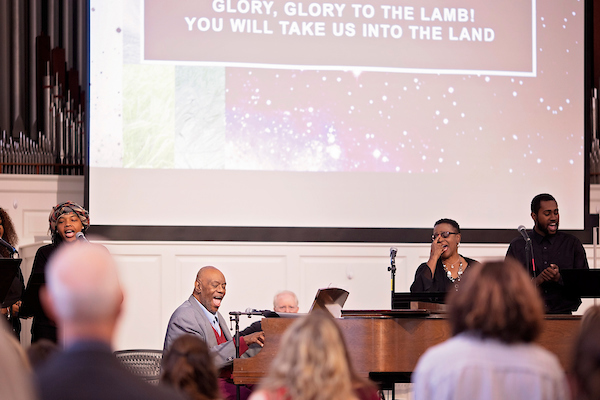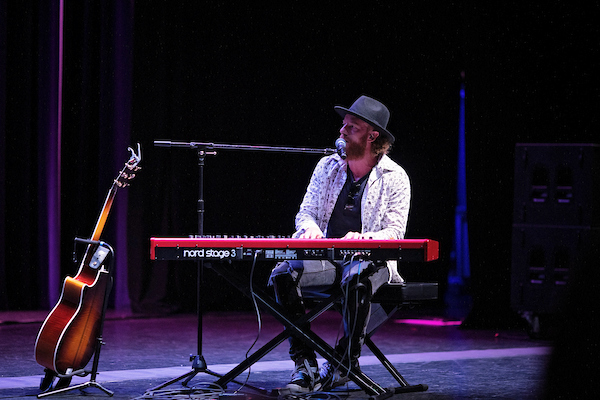
Worship leaders, pastors, visual artists and musicians from across the United States came together Oct. 24-25 at Samford University for a unique conference on the beauty of God.
Beeson Divinity School’s Robert Smith Jr. Preaching Institute and the School of the Arts’ Center for Worship and the Arts collaborated to host The Beauty of God: Preaching, Worship and the Arts Conference, which explored how the beauty of God’s love is manifested through the ministries of preaching, worship and the arts—and how the arts may support ministries of preaching and worship.
This conference, which was originally planned for 2020 but was delayed twice due to the COVID-19 pandemic, was the idea of Michael Pasquarello III, director of the preaching institute, whose research and writing have focused on God's beauty in Scripture and preaching.
“We preachers are always looking for things that will hook people and draw them in, and that tends to be done through illustrations and stories, sometimes video clips,” Pasquarello said. “But what I found is very little preaching lifts up God and invites the congregation to behold God's beauty, which is the expression of his glory in Jesus Christ and in the world.
“As we all know, beauty is attractive. And it’s delightful. And it’s enjoyable. So, it seemed very natural then to partner with the Center for Worship and the Arts, I think because we share so much in common.”
The schedule featured a diverse group of experienced practitioners, including John Witvliet, Kevin Twit, Debra Dean Murphy, Tyshawn Gardner, Cliff Duren and Matt Papa, as well as local artists, such as Daniel Cason, Joe Cory and InSpero.

Topics addressed during the conference included: “Why Musical Style Does Matter,” “Shepherding the Artist’s Heart: A Helpful Guide to Pastoring Artists in the Church,” “Beauty and Brokenness: Words and the Wounded World,” “Adventurous Preaching: Experiencing God’s Beauty in the Unexpected Places of Preaching” and “The Place and Work of Artists in the Church.”
Kara Fincher, associate minister to college students at Dawson Memorial Baptist Church in Birmingham, attended the conference, describing the experience as “a joy.”
“I regularly lead musical worship for college students at my local church, and this conference renewed a desire in me to include the arts intentionally in our weekly gatherings,” she said. “I always find it beneficial to step away from the daily details of my work and step back into a prayerful evaluating and visioning stage. My notebook is full, as is my heart.”
Cory, who is an associate professor of art and design at Samford’s School of the Arts, created an original piece of art for the conference as a permanent fixture in Beeson Divinity School. Titled “Soli Deo Gloria,” the painting is a direct reference to “God’s glory over everything as proclaimed in Psalm 96. The images symbolize the beauty and wonder of God’s creation, the colors and compositional structure are a nod to stained glass windows and church history, and the central cross is a direct reference to our salvation by grace alone through Christ’s death on the cross.”
In addition to Samford students who attended the conference, attendees came from eight states and represented 30 different churches.
Logan Creasy, associate pastor of worship and communications of First Baptist Church, Douglasville, Georgia, said, “The Beauty of God conference was a helpful yet challenging reminder to keep the wonder of God at the forefront of all we do in art, music and teaching. The speakers were knowledgeable and informative. The blend of worship genres was great and served to remind us of the breadth of Christ’s Church and her various expressions.”
Emily Andrews, director of the Center for Worship and the Arts and one of the conference organizers, said that “attending to God’s beauty is a powerfully insightful lens.”
“I am thankful for the collaborative and interdisciplinary spirit found among our partners at the Robert Smith Jr. Preaching Institute, our colleagues in Samford’s School of the Arts, and the administration of Samford University,” Andrews said. “Most especially, I am grateful to our sponsors at Lilly Endowment Inc., who has gifted us with the ability to convene such a robust group of experts and practitioners to consider how to faithfully practice preaching and worship.”
